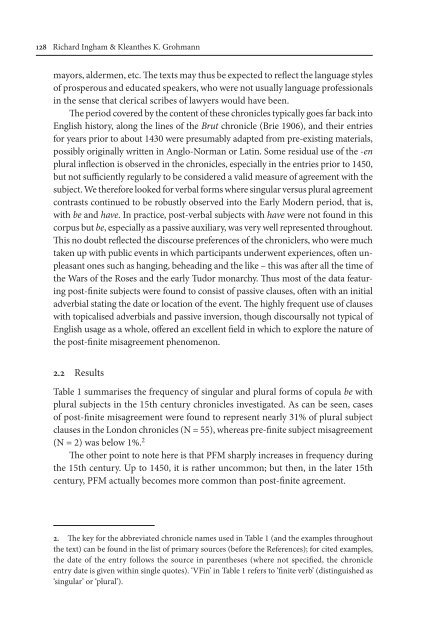Selected Papers from the Fourteenth International ... - STIBA Malang
Selected Papers from the Fourteenth International ... - STIBA Malang
Selected Papers from the Fourteenth International ... - STIBA Malang
Create successful ePaper yourself
Turn your PDF publications into a flip-book with our unique Google optimized e-Paper software.
128 Richard Ingham & Klean<strong>the</strong>s K. Grohmann<br />
mayors, aldermen, etc. The texts may thus be expected to reflect <strong>the</strong> language styles<br />
of prosperous and educated speakers, who were not usually language professionals<br />
in <strong>the</strong> sense that clerical scribes of lawyers would have been.<br />
The period covered by <strong>the</strong> content of <strong>the</strong>se chronicles typically goes far back into<br />
English history, along <strong>the</strong> lines of <strong>the</strong> Brut chronicle (Brie 1906), and <strong>the</strong>ir entries<br />
for years prior to about 1430 were presumably adapted <strong>from</strong> pre-existing materials,<br />
possibly originally written in Anglo-Norman or Latin. Some residual use of <strong>the</strong> -en<br />
plural inflection is observed in <strong>the</strong> chronicles, especially in <strong>the</strong> entries prior to 1450,<br />
but not sufficiently regularly to be considered a valid measure of agreement with <strong>the</strong><br />
subject. We <strong>the</strong>refore looked for verbal forms where singular versus plural agreement<br />
contrasts continued to be robustly observed into <strong>the</strong> Early Modern period, that is,<br />
with be and have. In practice, post-verbal subjects with have were not found in this<br />
corpus but be, especially as a passive auxiliary, was very well represented throughout.<br />
This no doubt reflected <strong>the</strong> discourse preferences of <strong>the</strong> chroniclers, who were much<br />
taken up with public events in which participants underwent experiences, often unpleasant<br />
ones such as hanging, beheading and <strong>the</strong> like – this was after all <strong>the</strong> time of<br />
<strong>the</strong> Wars of <strong>the</strong> Roses and <strong>the</strong> early Tudor monarchy. Thus most of <strong>the</strong> data featuring<br />
post-finite subjects were found to consist of passive clauses, often with an initial<br />
adverbial stating <strong>the</strong> date or location of <strong>the</strong> event. The highly frequent use of clauses<br />
with topicalised adverbials and passive inversion, though discoursally not typical of<br />
English usage as a whole, offered an excellent field in which to explore <strong>the</strong> nature of<br />
<strong>the</strong> post-finite misagreement phenomenon.<br />
2.2 Results<br />
Table 1 summarises <strong>the</strong> frequency of singular and plural forms of copula be with<br />
plural subjects in <strong>the</strong> 15th century chronicles investigated. As can be seen, cases<br />
of post-finite misagreement were found to represent nearly 31% of plural subject<br />
clauses in <strong>the</strong> London chronicles (N = 55), whereas pre-finite subject misagreement<br />
(N = 2) was below 1%. 2<br />
The o<strong>the</strong>r point to note here is that PFM sharply increases in frequency during<br />
<strong>the</strong> 15th century. Up to 1450, it is ra<strong>the</strong>r uncommon; but <strong>the</strong>n, in <strong>the</strong> later 15th<br />
century, PFM actually becomes more common than post-finite agreement.<br />
2. The key for <strong>the</strong> abbreviated chronicle names used in Table 1 (and <strong>the</strong> examples throughout<br />
<strong>the</strong> text) can be found in <strong>the</strong> list of primary sources (before <strong>the</strong> References); for cited examples,<br />
<strong>the</strong> date of <strong>the</strong> entry follows <strong>the</strong> source in paren<strong>the</strong>ses (where not specified, <strong>the</strong> chronicle<br />
entry date is given within single quotes). ‘VFin’ in Table 1 refers to ‘finite verb’ (distinguished as<br />
‘singular’ or ‘plural’).










